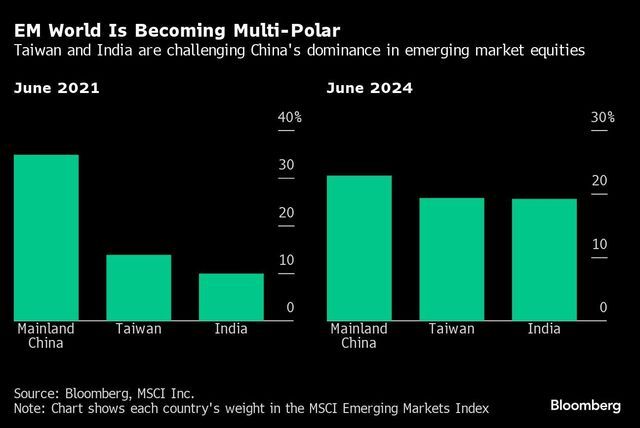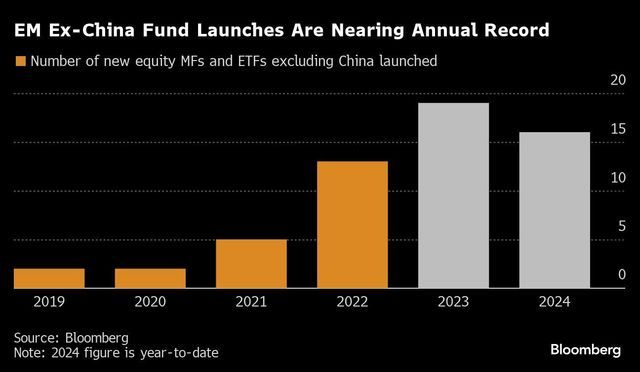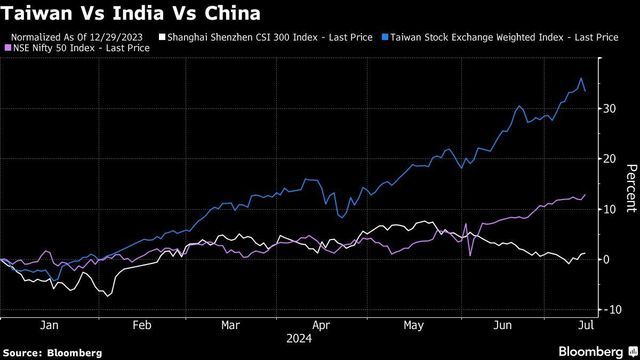


The Taiex Index and Nifty 50 both trade at about 20 times of forward estimated earnings, compared with MSCI China at a little above nine. (Photo: Reuters)
By Abhishek Vishnoi and John Cheng
The race to replace China’s top spot in emerging market equity portfolios is heating up, with Taiwan and India running neck to neck as formidable rivals.
Thanks to record stock rallies, Taiwan and India now command more than 19 per cent weightings each in the MSCI EM Index. That compares to China’s 22.8 per cent, whose standing has steadily shrunk over the past few years, Bloomberg-compiled data show.
The rise of Taiwan and India is allowing investors to better diversify by betting on artificial intelligence chipmakers and the infrastructure boom coming from Modi’s programs to modernise the country. As the US rate cycle peaks out, having attractive options in emerging markets is fundamental to any pivoting of capital flows.
)
At its peak in 2020, China accounted for 40 per cent of the MSCI EM Index, with investors lured by thriving e-commerce to sales of expensive liquor. That heavy weightage cost money managers dearly, with trillions of dollars wiped out as Beijing embarked on regulatory crackdowns and went on a deleveraging campaign for its indebted property sector.
If recent trends hold, Taiwan or India may catch up with China’s standing in MSCI EM this year, marking a shift into a multi-polar emerging markets world.
Taiwan’s ascent is all the more notable considering its market capitalisation — at $2.6 trillion — stands at less than a third of mainland China’s. The Taiex Index has risen 33 per cent this year to become one of the world’s best-performing major benchmarks, bolstered by gains in Nvidia Corp. supplier Taiwan Semiconductor Manufacturing Co.
Meanwhile, India’s Nifty 50 Index has advanced more than 12 per cent in 2024, hitting a fresh high as Prime Minister Narendra Modi promised policy continuity.
That’s in contrast to the sluggishness in Chinese stocks. Benchmarks have barely gained for the year, highlighting an urgency for policymakers to unveil a roadmap at the Third Plenum to resolve woes like the property crisis.
)
Earnings are a crucial factor behind the allocation preferences. The 12-month forward earnings estimates for the MSCI China Index have barely changed year to date, while those for Taiwan and India have increased by at least 13 per cent each.
“EM ex-China looks solid from an earnings angle,” said Kumar Gautam, a quantitative strategist with Bloomberg Intelligence. “The gap between China and EM ex-China earnings revision is at a historical high and China’s earnings revision are too slow to pick up.”
)
Still, money continues to support the shift.
Emerging Asia ex-China’s equity markets recorded net inflows of nearly $9 billion since the start of June, with South Korea, India and Taiwan among the top recipients, according to data compiled by Bloomberg. Meanwhile, mainland China has seen outflows via the trading links with Hong Kong during the period.
“Tech is eating the world,” said Pruksa Iamthongthong, deputy head of Asia equities at abrdn. “This only compounds with AI, and we see the real winners as Asian tech hardware and semiconductor supply chain names.”
First Published: Jul 13 2024 | 8:03 AM IST